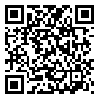BibTeX | RIS | EndNote | Medlars | ProCite | Reference Manager | RefWorks
Send citation to:
URL: http://jpcp.uswr.ac.ir/article-1-359-en.html
2- Department of Psychology, Faculty of Humanities, Arak Branch, Islamic Azad University, Arak, Iran.
3- Department of Psychology, Faculty of Psychology and Social Sciences, Roudehen Branch, Islamic Azad University, Tehran, Iran.
4- Department of Psychology, South Tehran Branch, Payame Noor University, Tehran, Iran.
Objective: Anxiety is one of the most common disorders of childhood. The treatment Interaction therapy can be used for determining anxiety symptomsis . In line with this, the Parent-Child Interaction Therapy (PCIT) has been successful in America as well as in some other countries. However, the application of this approach was more limited in Asia. The present study aimed at evaluating the extent of the effect of PCIT approach on child’s anxiety level according to mother’s anxiety index.
Methods: This randomized controlled trial was conducted at Bijan Center for Substance Abuse Treatment in Tehran, Iran, from December 1, 2013 to November 1, 2014. It involved parents referred to two addiction clinics for methadone maintenance treatment in regions of 7 and 9 in Tehran. A sample of 72 mothers and children (aged between 19 and 41 years with an average age of 29.4 years) were selected by convenient sampling method. According to the assumed cutting point score in anxiety index (response rate=94%), the subjects were assigned to two groups, i.e., control and experimental. Based on the three levels of mother’s anxiety, i.e., low, medium, and high levels (response rate=91%), the subjects were sub-divided into six groups. PCIT protocol was presented to experimental groups during the six weekly sessions. A pretest and a posttest (after 12 weeks of training) were administered to the participants. The analysis of data was done by two-way factorial variance analysis test (ANOVA), Scheffe Post-hoc test, and Chi-square using IBM SPSS Statistics Version 20 (IBM Corp., Armonk, NY, USA).
Results: The results showed that PCIT has been effective in reducing the anxiety among children whose mothers had low anxiety level (P<0.001) while it was not effective in reducing the anxiety symptoms in children whose mothers had medium and high anxiety levels (P>0.05). Confidence interval of scores of children’s anxiety in the group of mothers with low anxiety was 95%, which was estimated to be 6.94(3.68-10.19) in experimental group and 12.91 (9.59-16.22) in control group.
Conclusion: Implications of these protocols are discussed with regard to their unique potential to address the clinical needs of young children with internalizing problems. However, further research into the evaluation of PCIT using a randomized controlled trial is recommendable.
Received: 2017/01/10 | Accepted: 2017/06/2 | Published: 2017/07/1
| Rights and permissions | |
 |
This work is licensed under a Creative Commons Attribution-NonCommercial 4.0 International License. |







